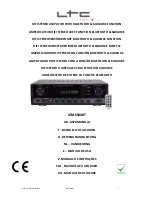
Page 31
Scene Off Command
Once the Scenes have been sent, press the 0 (OFF) key to command the four units in that Scene to turn off.
Notes:
1.
When sending Scene Commands, the controller must be configured to allow Extended Code transmissions on each House
Code affected by a Scene.
2.
The Scene Commands always apply to a group of four consecutive units, which are units 1-4, 5-8, 9-12, and 13-16 on a
particular house code. You must address the units accordingly so that the desired units fall into the appropriate lighting
groups.
3.
The actual Extended Code Scene commands use a "group reference" that matches that sent by a Leviton Wall-Mounted
Scene Controller set to the same address as the first unit in the lighting group. This allows wall-mounted controllers to be
easily used for manual Scene selection.
UPB Links
In a UPB network, all control operations are done using Links. OmniPro II can transmit and receive up to 250 Links on the UPB
network. Links are used to logically “connect” events on one or more devices to actions on one or more other devices. When two
or more different devices share a common Link, they are said to be “linked” together. They can now communicate with each
other over the powerline using the Link as a common identifier in all of their communications.
The power of Links is that you can “link” more than two devices together. For example, one keypad controller pushbutton can be
linked to four UPB Wall Switches allowing the single press of that pushbutton to trigger all four lights to go to preset or absolute
levels. In addition UPB Wall Switches allow for a preset light level and fade rate to be associated with each Link.
Activating and Deactivating Links
A special UPB command called “Link On” (activate) is used to command all of the devices that have the same Link to go to their
preset light levels at their preset fade rates.
For instance, in our “All On” and “All Off” example, when “Link 50 On” is transmitted by OmniPro II, each UPB Wall Switch
with Link 50 will go to 100% to achieve the “All On” effect. Other “Link On” (activate) commands may be transmitted that
cause Wall Switch ‘1’ to go to a desired level at a specified fade rate and Wall Switch ‘2’ to go to a different level at a different
fade rate. The ability to send more than one device to its preset level at a preset fade rate with a single command is known as
activating a Link. Likewise, pressing a pushbutton on a 6-Button or 8-Button Keypad can send the “Link On” (activate)
command.
A special UPB command called “Link Off” (deactivate) is used to command all of the devices that have the same Link to go to
0% at their preset fade rate. For instance, in our “All On” and “All Off” example, when “Link 50 Off” is transmitted by OmniPro
II, each Wall Switch with Link 50 will go to 0% to achieve the “All Off” effect.
Setting a Link (Lighting Scenes)
Lighting scenes are created by pre-configuring light levels and fade rates in one or more UPB devices that get “activated” and
“deactivated” by a Link command or button press on a 6-Button or 8-Button Keypad.
Each UPB Wall Switch can hold up to sixteen different preset light levels (0% - 100%) that can be “linked” to the OmniPro II
controller or to a pushbutton on a 6-Button or 8-Button Keypad.
OmniPro II can “set” each of the 250 possible Links. The “Link Set” command is used to set up lighting scenes for a lighting
group. To set a “lighting scene” using OmniPro II, adjust all of the UPB Wall Switches with the pre-configured Link to the
desired lighting levels. The desired lighting levels may be set manually at the switch, or by a command issued from OmniPro II.
After the desired lighting levels are set, the “Link Set” command can be transmitted by OmniPro II to save the new “light levels”
for each of the devices pre-configured with the specified Link.
Summary of Contents for Omni Pro II
Page 2: ...Copyright 2001 2007 Home Automation Inc All Rights Reserved...
Page 107: ......
















































